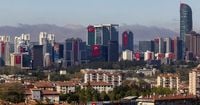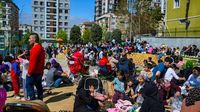A powerful earthquake of magnitude 6.2 struck off the coast of Istanbul on Wednesday, April 23, 2025, with its epicenter located in the Sea of Marmara. The quake, which occurred shortly before 1:00 PM local time, was strongly felt across the Turkish megacity, home to approximately 16 million residents, yet miraculously resulted in no reported casualties or significant damage, according to Turkish authorities.
The National Disaster Management Agency (AFAD) and Interior Minister Ali Yerlikaya confirmed the earthquake's details, stating that it occurred off Silivri, a district near Istanbul. Initial reports indicated that at least two aftershocks followed within seconds of the primary quake, causing widespread panic among the populace. Thousands of residents rushed into the streets, seeking safety in open areas, as they feared possible building collapses.
April 23 is a public holiday in Turkey, which meant many institutions, schools, and businesses were closed at the time of the earthquake. This likely contributed to the quick response of the populace, as many were already outside enjoying the day. Eyewitness accounts from various neighborhoods described a scene of chaos, with people fleeing their homes and gathering in parks. One painter, who was near the Galata Tower, recounted, "I felt the tremor and rushed outside. We panicked, but that’s all... we just took our legs to our feet. We can’t do anything, absolutely nothing."
Despite the panic, the authorities reported no casualties. However, Istanbul's governor, Davut Gul, mentioned that 151 people were treated for injuries related to the panic, with some having jumped from windows in their haste to escape. The governor urged citizens to avoid damaged buildings and assured that emergency services were on high alert.
Minister Yerlikaya noted that more than fifty aftershocks were recorded following the initial quake, including one significant aftershock measuring 5.9. These aftershocks were felt in various districts of Istanbul and even in neighboring regions, including Izmir on the Aegean coast, Sofia, the capital of Bulgaria, and the Greek island of Lesbos.
While there were no reports of significant structural damage, local television channel NTV did report the collapse of an unoccupied building in the Fatih district, which had reportedly been vacant for nearly 30 years. This incident raised concerns about the integrity of older buildings in the city, especially given Istanbul's precarious geological location.
Turkey is situated on two major fault lines, making it particularly vulnerable to earthquakes. Experts have long warned that Istanbul, located just 20 kilometers from the North Anatolian Fault, could experience a catastrophic quake of magnitude 7 or higher by 2030. This looming threat has led to widespread anxiety among residents, who live in constant fear of the so-called "Big One," a potential disaster that could lead to the collapse of hundreds of thousands of buildings.
Prominent seismologist Professor Naci Görur reassured the public via social media, stating that the recent tremors were not the major earthquakes anticipated for the Marmara region. "These tremors are not the major earthquakes we expect in Marmara," he explained. "The real earthquake here will be stronger and exceed 7 in magnitude," he insisted, urging both the population and the government to take precautions even when there is no immediate seismic activity.
The recent earthquake comes on the heels of a devastating quake that struck southeastern Turkey in February 2023, which resulted in over 53,000 deaths and widespread destruction in the ancient city of Antakya, formerly known as Antioch. The memory of that disaster looms large in the minds of many, heightening the sense of urgency for preparedness in the face of potential future quakes.
In Silivri, where the earthquake's epicenter was located, lies one of Turkey's main prisons, which houses several notable political figures, including Istanbul's opposition mayor, Ekrem Imamoglu, and philanthropist Osman Kavala. Following the recent unrest surrounding Imamoglu's arrest, the prison has seen an influx of detainees from protests. Reports indicate that the prison itself did not suffer any damage from the earthquake.
As the dust settles from this recent seismic event, Istanbul's residents are left to reflect on their vulnerability to such natural disasters. The government continues to monitor the situation closely, with President Recep Tayyip Erdogan stating that he is following developments and ensuring that all emergency services remain on alert.
While the immediate crisis may have passed, the underlying fears and the potential for future earthquakes remain at the forefront of public consciousness in Istanbul. With experts predicting an inevitable major quake, the call for enhanced building codes and community preparedness has never been more pressing. As Istanbul grapples with its geological reality, the resilience of its people will be tested in the face of looming natural threats.






